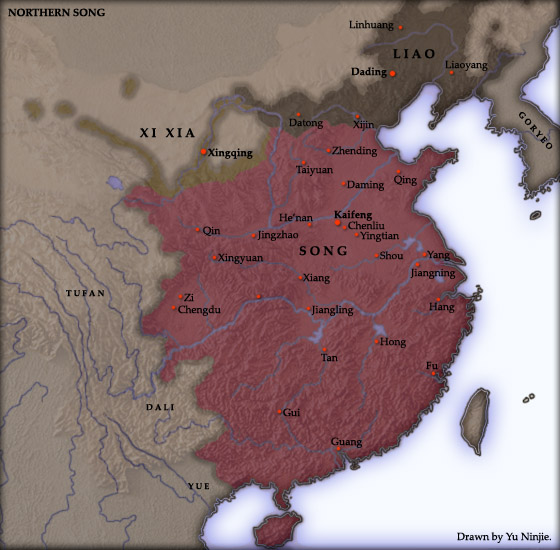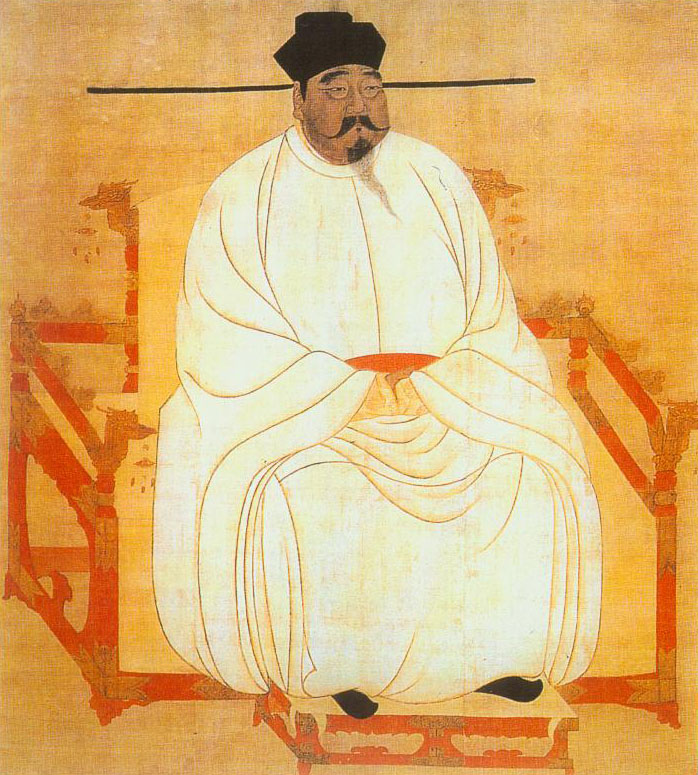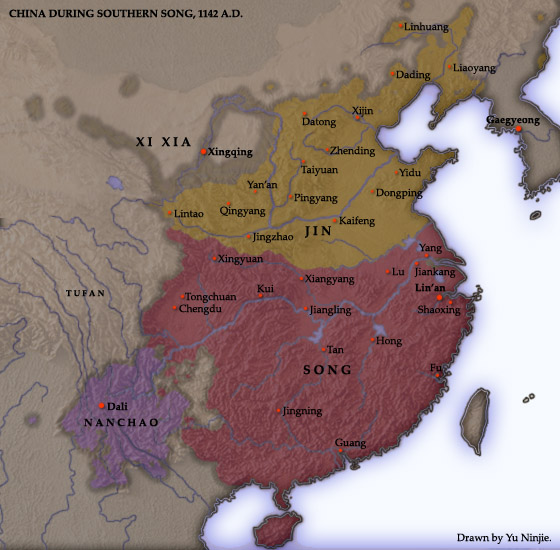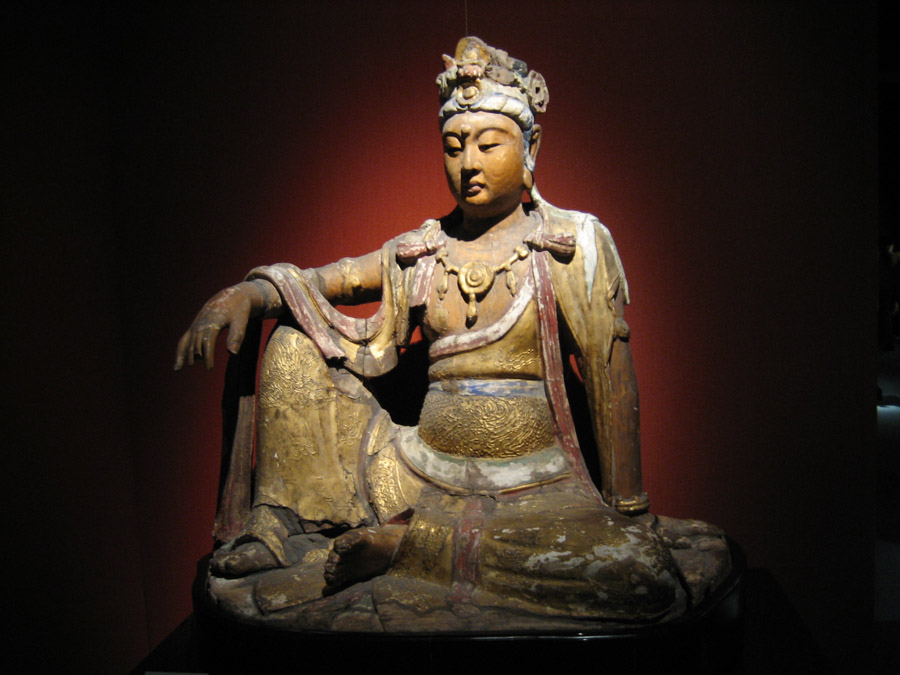Succeeding the Period of the Five Dynasties and Ten Kingdoms, Song Dynasty (960-1279) became the first Chinese government that built a permanent standing navy to protect its aquatic and land territory. The period 960-1279 of this dynasty was further divided into two: the Northern Song from 960-1127 with Bianjing (Kaifeng at present) as its capital and the ruling was mostly on the inner parts of China and; the Southern Song from 1127-1279 with Lin’an (Hanzou at present) as the capital. It was during the latter period that Jin Dynasty was already in control of the Northern part of China and Song moved to the Yangtze River.
The Early Song: the Times of the Northern Song
During the earlier years of the Northern Song, particularly from 970-976, the then Emperor Taizu built a resilient central administration that would rule the empire and paid great importance to the competitiveness and talent of bureaucrats through the conduct of examination for civil service, thereby disregarding social standing and connections. It was during his reign that technology and science were strongly supported and communication was promoted all over the territory. Among the most noted projects that the empire supported was that of engineer Zhang Sixun, an astronomical clock tower. The dynasty conquered lands and at the same time, it preserved good relationships with other countries in Asia both in terms of trade and diplomatic conduct.
Diplomatic Affairs
Song Dynasty (960-1279) implemented both diplomatic and military tactics in dealing with ethnic groups whose territories were said to be part of China. The Khitans from Liao Dynasty was one of the groups with whom the Northern Song has been dealing with for a long period of time but both parties agreed to settle the issues in 1005 when they signed the Shanyauan Treaty and Song had to pay the ethnic group. The dynasty endured both losses and triumph with other battles it went through, most of which were due to territorial disputes. The battle with the Ly Dynasty from Vietnam that took place during 1075 and lasted up to 1077 likewise ended in peace settlement and the exchange of prisoners in 1082.
Economic and State Employment Affairs
The court of Song encountered a conflicting period at the turn of the 11th century because of the ministers’ diversity of belief on how to handle the economy. Fan Zhongyan who was the chancellor, had been removed from office under duress due to his desire to implement changes in the salary system of common employees, the procedure of recruiting officials and the creation of programs that would fund the education of a number of people who could later work for the state. It was Wang Anshi who was supported by then Emperor Shenzong who moved for the implementation of new programs; raising the standards for the hiring of statesmen, changes in the land tax, and even creating certain government monopoly system.
Turmoil and the Establishment of the Southern Song
However, not everyone was happy with the reforms presented, groups who were considered conservative objected to these programs. Different leaders criticized one another and disputes arose, there were even leaders or known critics who were imprisoned. The political division led to internal problems within the dynasty and the alliance they formed were other groups who saw their weakness ended up attacking the dynasty; it was the Jurchens, once an ally, that invaded and captured the capital as well as the former Emperor Huizong, the successor Quinzong and other members of the royal court. Thus the conquest led to the division of the Song Dynasty (960-1279). Emperor Gaozong, a self-pronounced ruler of the Song forces then established Southern Song.
Military Accomplishments and Technology
The Southern Song had competent military officers like Han Shizhong and Yue Fei. The administration supported building of ships and the development of better harbors as well as the creation of warehouses and beacons that would fuel naval trade overseas and other international seaports, like that of Xiamen, Guangzhou, Quanzhou which boosted the economy of China. Song Dynasty created China’s first stable armada in the year 1132, with Dinghai as headquarter. In the year 1161, during the time of Tangdao and Caishi Battle, the dynasty made use of marine vessels equipped with trebuchet propelers that hurled gunpowder bombs. The Song Dynasty triumphed over the two battles.
After the success of the naval battle, the government went to sequester lands that belonged to the gentry to fund the projects; because of this the loyalty of the members of the society had been severed. The economic situation likewise continued to deteriorate since many wealthy families used their connections to be granted tax exemptions.
The Mongols and the Song Conflict
The Mongols attacked the Song dynasty and during the year 1268 up to 1273, Kublai blocked Yangzi River with his fleet and officially declared the formation of Yuan Dynasty in the year 1271. By 1275, the Song troops were defeated by Kublai’s army and by 1276; majority of the territory of Song Empire had been seized by Yuan troops. It was in the Yamen Battle that took place in 1279 at the Pearl River Delta, when Yuan armed forces, with its leader Zhang Hongfan, at last crumpled the Song struggle. Emperor Huaizong of Song Dynasty, who was then eight years old, gave in to suicide, together with Lu Xifu who was a Prime Minister and the imperial clan’s 800 members; the remaining citizens were untouched. The overthrown Emperor Gong was reduced to the ranks of a duke and after some time he was banished to Tibet, it is where he embraced a reclusive existence.
Song Technological Developments
Song Dynasty (960-1279) may have ended but it has played a major role in the history of China and the world as well. It had been a period of governmental superiority and intricate public association. There were numerous schools and places of worship established during this period as well as homes for retirement, public clinics, and even what is referred to as pauper’s graveyard. Since communication was given importance during this dynasty, the postal services were improved and provided more postal workers, bigger stations and offices to ensure that there is no further delay in the delivering of messages.
Women’s Rights During the Song
The women during Song Dynasty (960-1279) remained on an inferior societal standing than the men but they were likewise vested with societal and legal rights to allowed them to manage their household and establish businesses. They were given large dowries and legal rights when it came to acquiring property. They were also on equal footing with men when it came to inheritance and they educated their children during the early years of their lives. This dynasty afforded not only women’s rights but left behind a rich and diverse culture.



